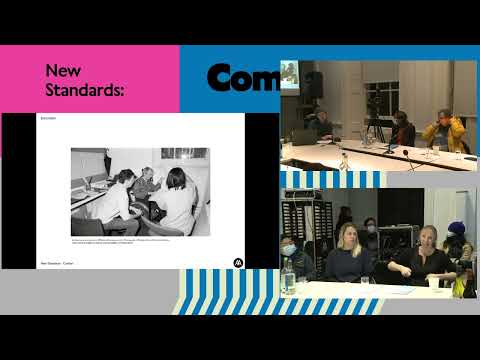
New Standards will identify and confront some of the barriers to architecture, its education and practice, and consider how these can be overcome to embrace wider forms of creativity. Each event in the series will address the idea of comfort to challenge the idea of ‘standards’ as a bare minimum or one-size-fits-all approach. Together, we will question how we might better provide comfort in all its nuanced forms.
The final event in the New Standards series this autumn will reflect on different notions of comfort in the spaces we design and use, how comfort has been standardised, and how we should interrogate this classification to move beyond the limitations of frameworks. Jordan Whitewood-Neal will discuss his research addressing disability and the tension between accessibility and retrofitting – exploring the history of disability at the Architectural Association, Dr. Jos Boys will discuss her alternative handbook for ‘architecture, dis/ability and designing for everyday life’ and Marsha Ramroop will discuss the intersectionality of inclusion and cultural intelligence.
The conversation will take place around a communal table to facilitate an open and comfortable discussion between the presenters and attendees. Free food and drink will be available throughout the evening.
DR. JOS BOYS (she/her) is co-founder and co-director, with Zoe Partington, of The DisOrdinary Architecture Project which brings disabled artists into built environment education and practice to critically and creatively re-think access and inclusion. Originally trained in architecture, she was co-founder of Matrix feminist architecture and research collective in the 1980s and one of the authors of Making Space: Women and the Man-made Environment Pluto 1894 (republished by Verso, 2022). Since then she has been a journalist, researcher, consultant, educator and photographer; and has published several books, including Doing Disability Differently: an alternative handbook on architecture, dis/ability, and designing for everyday life Routledge (2014) and editor of Disability, Space, Architecture: A Reader Routledge (2017). Her research and practice explores how everyday social, spatial and material practices come to frame what is ‘ordinary’ as a way of co-developing design interventions that challenge norms about who gets valued and who doesn’t (in society, in the design of built space and in architecture as a discipline).
MARSHA RAMROOP (she/her) is a global award-winning Equity, Diversity and Inclusion (EDI) strategist, and Founder Director of Unheard Voice Consultancy Ltd. She has formulated a culture change methodology which has been recognised as successful with an international prize from the UN-backed conglomerate of best practice for personal and organisational development, the IFTDO. She was the inaugural Director of Inclusion and Diversity at the Royal Institute of British Architects (RIBA) so has a clear understanding of how a traditional profession has been running and the challenges it faces. Her culture change programme for staff at RIBA received 100% recommendation feedback from managers and significant behavioural shift within months. Marsha is also Vice-Chair of the Institute of Equality and Diversity Professionals, an institute which strives to verify and set standards for the growing vocation of EDI practitioners. She works with the Cultural Intelligence Center, the global headquarters of cultural intelligence (CQ) as one of their published and highlighted thought-leaders on impactful organisational change, as well as a worldwide trainer and facilitator.
JORDAN WHITEWOOD-NEAL (he/him) is an architectural researcher, designer and artist whose work addresses disability, domesticity, pedagogy, and cultural infrastructure. He is currently co-leading a Design Think Tank at the London School of Architecture on Retrofitting as a process of civic reparation. Jordan is also an Architecture Foundation Young Trustee, and co-founder of disability centered research collective DIS/ which tackles the lack of disabled voices in architectural discourse, criticism, and community engagement in the built environment.